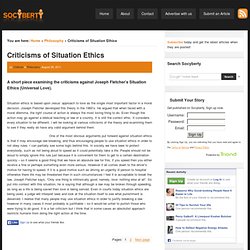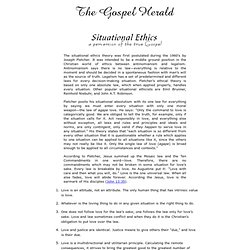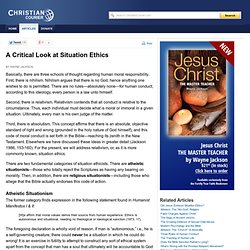

Strengths and Weaknesses Table. Henry's group video. Situation Ethics. Criticisms of Situation Ethics. Situation ethics is based upon Jesus’ approach to love as the single most important factor in a moral decision.

Joseph Fletcher developed this theory in the 1960’s. He argued that when faced with a moral dilemma, the right course of action is always the most loving thing to do. Even though the action may go against a biblical teaching or law of a country, it is still the correct ethic. It considers every situation to be different. I will be looking at various criticisms of the theory and examining them to see if they really do have any valid argument behind them. Situation Ethics. Situation Ethics Christianity has been dominated by natural law thinking, and situation ethics arose from this background.

It believes that there is only one ultimate duty, ‘to love thy neighbour’. Joseph Fletcher developed situation ethics in his book, “Situation Ethics” (1966). He believed that it is unwise to start from fixed rules and then deduce from them what should be done in any particular situation. Fletcher wanted to maintain the fundamental feature of Christian morality, agape love. He recognised that ‘love’ does not always help, so he conceded that rules could help to inform a person’s decision. Where love demanded that a conventional moral rule should be set aside, it was right to do so. According to Catholic moral theology, abortion is immoral and can never be permitted.
The four working principles. • Pragmatism – it is necessary for the proposed option to work and to be judged by ‘love’. • Relativism – Anything goes. Situation Ethics. Situational Ethics. The situational ethics theory was first postulated during the 1960's by Joseph Fletcher.

It was intended to be a middle ground position in the Christian world of ethics between antinomianism and legalism. Antinomianism says there is no law—everything is relative to the moment and should be decided in a spontaneous fashion with man’s will as the source of truth. Legalism has a set of predetermined and different laws for every decision-making situation. Fletcher’s ethical theory is based on only one absolute law, which when applied properly, handles every situation.
Other popular situational ethicists are Emil Brunner, Reinhold Niebuhr, and John A.T. Fletcher posits his situational absolutism with its one law for everything by saying we must enter every situation with only one moral weapon—the law of agape love. According to Fletcher, Jesus summed up the Mosaic law and the Ten Commandments in one word—love. A Critical Look at Situation Ethics.
By Wayne Jackson Basically, there are three schools of thought regarding human moral responsibility.

First, there is nihilism. Nihilism argues that there is no God, hence anything one wishes to do is permitted. There are no rules—absolutely none—for human conduct; according to this ideology, every person is a law unto himself. Task by Mr. Mears. Philosophical Investigations. Situation Ethics - OCR Religious Studies Philosophy and Ethics A level. Situationist Fletcher quoted a St Louis cab driver who said “Sometimes you’ve gotta put your principles to one side and do the right thing”.

Rules (or principles) aren’t the same thing as doing what is right. Some ethical theories suggest legalistic rules that mustn’t be broken, This is wrong as it makes rules more important than people, and doesn’t allow exceptions. There are antinomians who reject rules entirely. This is wrong as it leads to complete chaos with no laws at all, and no way of choosing between two courses of action.
Best Interests Agape - "... goodwill at work in partnership with reason" in seeking the "neighbour's best interest with a careful eye to all the factors in the situation". The Four Working Principles Pragmatism For a course of action to be right, it has to be practical. Relativism ‘It relativizes the absolute, it does not absolutize the relative’.
This means that rules (absolutes) don’t always apply, they depend on the situation. Positivism Personalism. A key strength. Concentration Camp dilemma by Rachel. A case study: by C Hodgkins. Ethics - Introduction to ethics: Situation ethics.